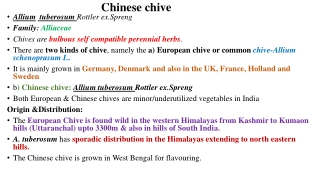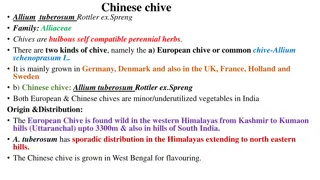Chinese chive
Chinese chives, scientifically known as Allium tuberosum, are bulbous perennial herbs that are underutilized in India. They are cold-hardy plants that prefer temperatures between 17°C and 25°C and well-drained soils with a pH range of 6-7. Chinese chives have multiple culinary uses due to their mi
0 views • 7 slides
Phylogenetic Analysis of Enzyme Sequences in Plant Species
The content discusses the amino acid sequence alignment and phylogenetic tree analysis of enzyme sequences, specifically DcLCYB2, among different plant species including Daucus carota, Carica papaya, Citrus maxima, Solanum lycopersicum, and Crocus sativus. The study explores the genetic relationship
2 views • 5 slides
Biocontrol Activity of Actinomycetes Against Pathogens of Tomato and Carrot
Plants face various stresses due to climate change, making them vulnerable to pathogens. Actinomycetes, such as Streptomyces, are beneficial soil bacteria with antimicrobial properties that can promote plant growth and suppress diseases. Research explores their antagonistic activity against fungal a
0 views • 13 slides
Comprehensive Guide to Chinese Chive (Allium Tuberosum): Botany, Cultivation, and Uses
Chinese chive, a bulbous perennial herb, comes in two varieties - European and Chinese. Originating from the Himalayas and being grown in various regions, it is a minor vegetable in India. Known for its mild garlic-like flavor, chive leaves are rich in nutrients and used in cooking, salad, and tradi
0 views • 7 slides
Microgravity's Effects on Solanum tuberosum Resistance to Phytophthora infestans
Experiment conducted by high school students to test the resistance of blight-resistant potato variety Solanum tuberosum to Phytophthora infestans in microgravity. Aim is to provide insights on growing stable food sources in space. Utilizing materials like P. infestans and Solanum tuberosum cubes, t
0 views • 10 slides




